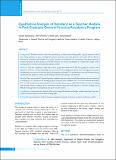Please use this identifier to cite or link to this item:
https://hdl.handle.net/20.500.14356/986Full metadata record
| DC Field | Value | Language |
|---|---|---|
| dc.contributor.author | Bajracharya, Sumana | - |
| dc.contributor.author | Shrestha, Ashis | - |
| dc.contributor.author | Joshi, Arabind | - |
| dc.contributor.author | Maharjan, Rony | - |
| dc.date.accessioned | 2023-04-19T05:35:47Z | - |
| dc.date.available | 2023-04-19T05:35:47Z | - |
| dc.date.issued | 2022 | - |
| dc.identifier.citation | BajracharyaS., ShresthaA., JoshiA., & MaharjanR. (2023). Qualitative Analysis of Resident as a Teacher Module in Post Graduate General Practice Residency Program. Journal of Nepal Health Research Council, 20(3), 786-793. https://doi.org/10.33314/jnhrc.v20i3.4101 | en_US |
| dc.identifier.issn | Print ISSN: 1727-5482; Online ISSN: 1999-6217 | - |
| dc.identifier.uri | http://103.69.126.140:8080/handle/20.500.14356/986 | - |
| dc.description | Original Article | en_US |
| dc.description.abstract | Abstract Background: Residents need to show their proficiency in clinical and teaching skills. A good amount of their time during residency is spent teaching their juniors. Moreover, once they graduate, their roles will be clinician and teacher. Therefore, the “Resident as a teacher” module was included in the curriculum of the general practice residency program at Patan Academy of Health Sciences. This study was designed to evaluate the change in the teaching skills of residents after going through the module. Methods: This was a qualitative study where three groups were interviewed. The first group was residents who underwent ‘Resident as Teacher Training’ and were involved in teaching their juniors. The second group was junior residents who were involved as learners and the third group was faculties. The questionnaire was used for interviewing and the thematic analysis was done and the findings of these three groups were analyzed. Results: There was a total of 25 general practice residents who were interviewed. The residents who were involved in teaching (N=11) stated that the training program increased their confidence 8(72.7%) and communication skills 8(72.7%). The residents who were learners (N=9) stated that they are more comfortable with the seniors in teaching and learning sessions. Faculties (N=5) stated that residents interacted well. Barriers to effective teaching were, difficult to manage time for preparation and supervision by faculty. Conclusions: General practice residents who went through the Resident as Teacher module stated that they were confident and had improvement in their teaching skills. Keywords: General practice resident; Nepal; postgraduate program; resident as a teacher; student as a teacher. | en_US |
| dc.language.iso | en | en_US |
| dc.relation.ispartofseries | July-Sep, 2022;4101 | - |
| dc.subject | General practice resident | en_US |
| dc.subject | postgraduate program | en_US |
| dc.subject | resident as a teacher | en_US |
| dc.subject | student as a teacher | en_US |
| dc.title | Qualitative Analysis of Resident as a Teacher Module in Post Graduate General Practice Residency Program | en_US |
| dc.type | Journal Article | en_US |
| Appears in Collections: | Vol 20 No 3 Issue 56 july-Sep, 2022 | |
Files in This Item:
| File | Description | Size | Format | |
|---|---|---|---|---|
| 4101-Manuscript-30794-1-10-20230314.pdf | Fulltext Download | 317.34 kB | Adobe PDF |  View/Open |
Items in DSpace are protected by copyright, with all rights reserved, unless otherwise indicated.
